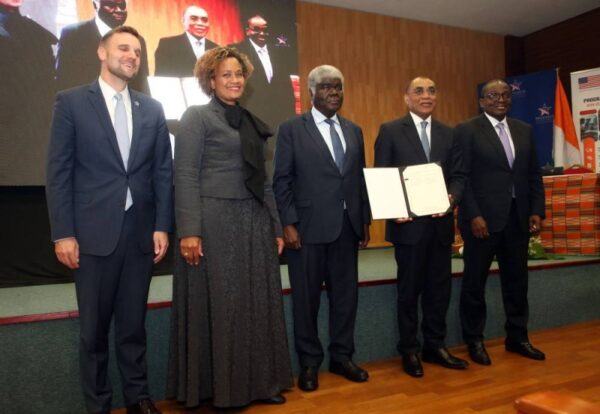On September 16, 2025, Ivory Coast concluded a regional Compact with the United States totaling $322 million, including $300 million (168 billion CFA francs) funded by Washington and $22.5 million provided by the Ivorian government. The signing, presided over by Prime Minister Robert Beugré Mambé at the Auditorium of the Prime Minister’s Office, brought together Jason Small, Vice President of the Millennium Challenge Corporation (MCC) for Operations, and Adama Coulibaly, Minister of Finance and Budget, who signed the agreement aimed at strengthening Ivory Coast’s role as a regional energy hub.
This new regional Compact follows the $536 million bilateral Compact signed in 2017, the official closure of which was confirmed at the same ceremony. The Prime Minister praised the quality of Ivorian-American relations, described as a “relationship built on trust, nurtured by rigor, and consolidated by concrete results.” He recalled that the previous partnership led to the construction of road infrastructure, 40 local colleges, technical training centers, and two university campuses, significantly contributing to improving living conditions and reducing poverty.
Fidèle Sarassoro, Chairman of the Board of the Millennium Challenge Account (MCA Ivory Coast), assured that lessons learned from the implementation of the bilateral Compact will optimize this new program. He emphasized the importance of continuing to meet MCC’s eligibility criteria, particularly through the Scorecard, to maintain and strengthen Ivory Coast’s governance performance. Jason Small praised a “working model” and reaffirmed the United States’ commitment to supporting inclusive economic growth beneficial for the entire West African region.
U.S. Ambassador Jessica Davis Ba highlighted that this regional Compact is the first signed since President Donald Trump returned to the White House, illustrating the strategic importance of energy cooperation between the two countries. Ivorian Minister of Mines, Petroleum, and Energy, Mamadou Sangafowa Coulibaly, called for exploring new investment opportunities in the electricity sector, particularly to modernize infrastructure, improve distribution, and integrate alternative energies. He pledged to ensure a “rigorous, transparent, and exemplary” implementation of this program to maximize its economic and social impact.


